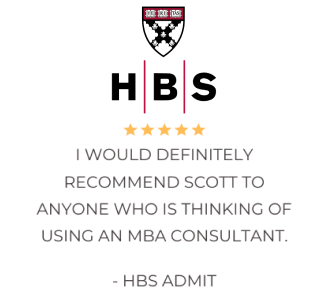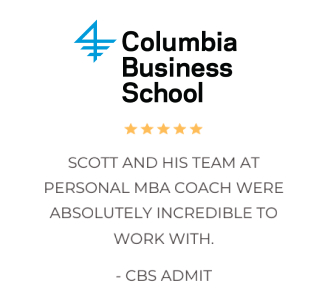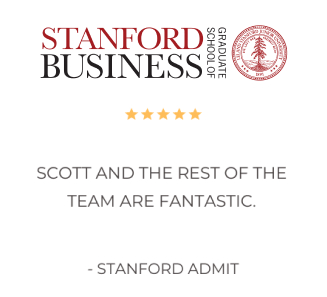Letters of recommendation are an essential component of an MBA application. Admissions Committee members rely on recommenders to vouch for you: to corroborate—and, in fact, bolster—all that you will tell them is worthy and commendable about you, and to speak objectively about your candidacy.
As you narrow your school lists, study for the GRE/GMAT and think about your goals, letters of recommendation should also be top of mind for your MBA application. Not only must you select the ideal recommenders, but you also must prepare them adequately! Personal MBA Coach’s Round 2 clients are already working on selecting and preparing their recommenders. Ready to get started? Schedule a consultation below!
It can be tempting to select the person with the most prestigious resume or the person easiest to discuss your business school plans with. Personal MBA Coach encourages you not to take this approach and instead to carefully weigh your options.
How do you select the ideal person to write your letter of recommendation?
To answer this question, consider these six guiding principles.
1) Do not just look for impressive titles.
This is not to say that impressive titles are a bad thing, but their title does not matter as much as their knowledge of and esteem for you. Admissions Committee members will see right through a strategy to have the CEO of your company, with whom you sat in on one meeting, write a letter for you. Not only will they not be able to explain the most important aspects of your candidacy, but it may not be a very credible letter if it is clear you do not have a strong relationship with the recommender.
2) Choose recommenders who will take the time to write thoughtful, detailed letters.
Select someone who will go the extra mile to delineate your worth and merits. Generalizations or unsubstantiated flattery will not help you. Choose recommenders who understand the application and selection processes and, within them, the importance of letters of recommendation. You want LORs that add a special, memorable detail about you and that make your candidacy sparkle.
Not everyone is great at writing and, similarly, not everyone realistically has time to draft a carefully thought-out letter. The quality of the writing is important in demonstrating your candidacy. That said, do not worry about English proficiency. Letters are not evaluated based on grammar.
3) Identify recommenders who know you well.
This is one of the most important pieces of advice we can provide. The best letters show intimate understanding of the candidate. Your recommender should be familiar with your character, your strengths, your weaknesses and your career aspirations. It is best if your recommender(s) immediately supervised you and took notice of your growth, increased responsibility, and sense of leadership. The use of specific examples will be important and the better the recommender knows you, the clearer and more genuine these will be.

4) Select someone who can compare you to other candidates (if possible).
A good letter will compare you to other candidates, putting your accomplishments in perspective (more on this below). For that reason, an ideal recommender will have the experience and exposure to compare your strengths and weaknesses to those of your peers. While this may not always be possible (and that alone is not a reason to eliminate a recommender), if you are comparing two similar candidates, this is an important factor to keep in mind.
5) Ask nonprofessional references if you have strong extracurriculars and/or weak recommendation options at work.
While the general advice is to select professional supervisors to write your MBA letters of recommendation, there are some exceptions to this rule. Some applications may be well served selecting at least one recommender from other walks of life: an extracurricular activity, for example, or a nonprofit you have volunteered for. If you have taken a major role in an activity outside of work, your supervisors there—and even colleagues—might be able to speak in a more informed manner about a trait that you really want highlighted in your application because it is central to you and the achievement of your goals. Further, they will be able to provide a different perspective on your candidacy.
Similarly, if you do not have a suitable professional reference option, perhaps because you absolutely cannot tell your supervisor you are applying to business school (more on that below) or because your company is structured such that you do not work closely with one particular person, you may be best suited selecting a nonprofessional reference.
6) Use additional influential / alumni letters in some cases.
While we said title should not be a factor in selecting your recommenders, some candidates might be lucky enough to have a close relationship (even a personal one) with someone who has strong ties to the school of their dreams. In this case (and you never know what connections you might have until you inquire), it is worth taking the time to consider them as an additional recommender.
Again, this is on a case-by-case basis, and Personal MBA Coach is happy to advise clients on this specific situation as part of our Comprehensive Packages service.
Remember, regardless of whom you select to write your letters of recommendation, early notice is key. Do not wait too long to make these requests. Personal MBA Coach is already working with the Round 1 clients on their letters of recommendation strategy.

What to do if you are keeping your MBA Plans a secret at work
Every year we have clients who do not feel comfortable telling their employers about their MBA plans. Regardless of the reason for this hesitation, many of you may be wrestling with how to handle the LOR process if your boss is not as supportive as you might like.
Applicants in this situation generally have 3 options:
-
Delicately test the waters with your boss, they may be more receptive than you think.
-
Identify one or two trusted colleagues to share your plans
-
Ask someone outside of your current company to write your letter of recommendation
The best option to select will generally depend on how long you have been at your current job, what other options you have outside of work, and whether you have a true trusted resource within the company.
Although admissions committees prefer recommendations from current managers, they understand that not everyone is comfortable asking their current boss for a recommendation.
However, if you do not have someone who can speak to your current successes, your application could be weakened. This potential impact is even more pronounced if you have only had one full-time job post undergraduate and do not have anyone else who can write directly about your performance at work. In this case, we recommend that you start by testing the waters with your firm.

Perhaps your boss might be more open to the idea than you initially thought. Spend some time evaluating whether this may be the case by speaking with others at the firm more broadly about their experiences. You may want to have an initial conversation to explore “your development” and see where the conversation takes you. We have had clients who assumed their bosses would not be supportive only to have them actually suggest an MBA during these “development” discussions. That said, be sure to understand the politics internally so that you protect yourself and your career while doing so.
If you do not feel comfortable testing the waters or if this test fails, the next step is to consider your other relationships within the firm. Perhaps there is an indirect supervisor or a more senior manager who can speak to your potential but who might be more supportive.
Finally, if neither of these situations apply, look for a boss from a previous employee or a non-professional reference.
Keep in mind, if you cannot ask someone you work with, then you can write a brief optional essay about why you chose not to get a recommendation from your current employer.
We realize this situation can be tricky to navigate which is why we include letters of recommendation support in our comprehensive package offering!
How Should You Take an Active Role in Preparing Your Recommenders?
Once you have chosen your recommenders, your involvement in the process has just begun! We often hear of candidates who ask someone to write a letter of recommendation, ensure it gets submitted, and call it a day. This can be a big mistake! Your role in the MBA letter of recommendation process should be much more involved.
You should take an active role to ensure that your recommenders understand what the business school wants, its values and culture. You do not want a recommender to write pages of fluffy praise: You want substance and detail, both about your accomplishments and your promise, that show a good fit between you and your school of choice. We recommend you do the following:
- Open communication! Talk with your recommenders about the schools you are applying to and the letter of recommendation for that MBA program.
- Share your goals with your recommenders: The more your recommenders know about your short-term and long-term aspirations, the better equipped they will be to select pertinent stories about you and to emphasize accomplishments or traits that demonstrate your potential to reach your goals.
- Remind your recommenders of your accomplishments and successes: Make sure you and your recommenders are on the same page about your biggest accomplishments at work, your challenges, and the value you brought to the firm, company or nonprofit organization. Your recommenders are busy, and it is easy for them to forget details. Take the time to think of the top stories you would like them to recount and remind them of your role in certain projects or assignments. Not only will this make their lives easier, it also will ensure they share the best stories.
- Discuss your essays with your recommenders: It is important for recommenders to be fully in touch with your application as a whole. Specifically, it is helpful for them to know what you are writing about in your essays so there is no contradiction or dissonance between the essays and the letter of recommendation. Beyond your goals, let them know the traits you are highlighting and the success stories you are telling. The idea is for the letter to complement the rest of your application. This means you do not want them to repeat exactly what you are already saying; at the same time, you want to make sure there is no conflicting information. If your recommenders have a sense of your stories, they will be better equipped to share examples of accomplishments that demonstrate a complementary skill set or touch on an area you were not able to cover in your essays. The more they know about what you are writing in your essays, the more successful this will be.

- Make sure you are embodying the skills you want substantiated in your LORs: If there are skills or leadership traits you want evidenced, make sure you have demonstrated them to your recommenders. If you are not sure that you have, use the application time to take on an extra responsibility at work, or take charge of an activity that would give you the chance to show off that skill or leadership trait. Whatever you can do to show your strengths (particularly if you are starting early!) will help ensure your recommenders have enough examples to write a glowing LOR. Keep this in mind when you are at the office or client site at 8 PM and debating whether to leave or burn the midnight oil.
- If possible, ask your recommenders to distinguish you from others: Just as we advise that your resume and essays go beyond listing tasks, your recommendations should go beyond recounting what you have done. Successful MBA students are leaders who have differentiated themselves from their peers, going above and beyond what would be expected in the role. One of the best ways to show this is to compare you to your peers and others who have had the job previously. The best way for your recommenders to discuss your accomplishments and successes is by highlighting how you excelled compared to others who held your same job or role. Did you outshine others in your position by doing something especially well? Or did you go above and beyond expectations? Ask your recommenders to discuss that in their letters.
Remember, this is not time for false modesty. Do not be shy: You may never get this opportunity again.
Need help navigating the letter of recommendation process?
Contact Personal MBA Coach today to learn how we can help you through the MBA application process and make sure your MBA recommenders are the right ones for your application!




















